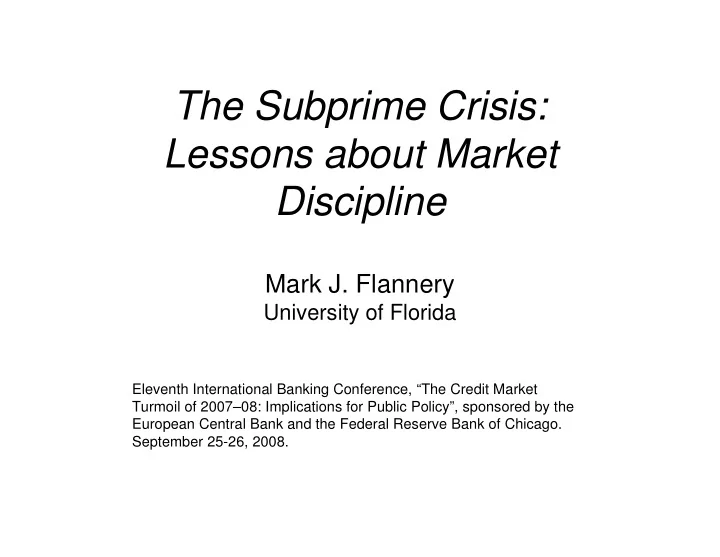

The Subprime Crisis: Lessons about Market Discipline Mark J. Flannery University of Florida Eleventh International Banking Conference, “The Credit Market Turmoil of 2007–08: Implications for Public Policy”, sponsored by the European Central Bank and the Federal Reserve Bank of Chicago. September 25-26, 2008.
Outline 1. What happened? 2. Market Discipline defined 3. Lessons a. For market “monitoring” b. For market “influence” 4. Reforms 5. Is the concept of market discipline dead? 2
What happened? Growing volume of subprime loans Many securitized and tranched: –“better than Aaa returns” –little recourse to underwriters Default risks highly correlated with housing prices 3
“An economist sees something work in practice and wonders if it can work in theory.” Were these underwriting and securitization arrangements fundamentally flawed?
To assess market discipline, we need to decide: 1. Were these loans reasonable investments, ex ante ? Or should “influence” have prevented them? 2. Why did investors purchase securitizations when arrangers had so little skin in the game? 3. Did market prices reflect risks? Value? 4. How did the rating agencies affect other market participants’ actions? 5
Market Discipline Defined What is it? Use market information and investor pressure to help control risk-taking in financial firms. 1. Monitoring a) prices of stock, bonds b) quantities of debt available 2. Influence a) Direct b) Indirect 6
Pros and Cons of Market Discipline Market monitoring reflects firm condition – own money – forward looking, use more creating methods Market influence can occur quickly – Legal/administrative restrictions But, is transparency enhanced by supervisors’ private information? Use market information to induce speedier problem resolutions. (E.g. Bliss (2001)). 7
An Ideal Market Discipline Scorecard Monitoring Influence Loan originations Loan sales to other investors Ratings Reaction to losses 8
“Monitoring”: did market prices provide advance warning? Represent financial sector equity with four Fidelity “sector funds” – Brokers – Financial Services – Insurance – Banking Not a true return series … 9
Monthly Sub-Index Values, rel. to Apr. 1988 25 20 15 Brokers Fin Svcs 10 Insurance Banks 5 0 Apr-88 Apr-90 Apr-92 Apr-94 Apr-96 Apr-98 Apr-00 Apr-02 Apr-04 Apr-06 Apr-08 10
Financial Index, SP500, rel. to Apr. 1988 20 18 Fin Index 16 SP500 14 12 10 8 6 4 2 0 Jan-00 Jan-01 Jan-02 Jan-03 Jan-04 Jan-05 Jan-06 Jan-07 Jan-08 11
10 12 14 16 18 20 0 2 4 6 8 Jan-05 Apr-05 Jul-05 Financial Index, SP500, rel. to Apr. 1988 Oct-05 SP500 Fin Index Jan-06 Apr-06 Jul-06 Oct-06 Jan-07 Apr-07 Jul-07 Oct-07 Jan-08 Apr-08 Jul-08 12
0.5 1.5 2.5 0 1 2 1/3/1997 1/3/1998 1/3/1999 1/3/2000 CDM3 - TBM3 (% points) 1/3/2001 1/3/2002 1/3/2003 1/3/2004 1/3/2005 1/3/2006 1/3/2007 1/3/2008 13
14
Market Discipline Scorecard Monitoring Influence Loan originations Loan sales to other investors Ratings Reaction to losses 15
What went wrong with security prices? Unusual(!) opaqueness Before the crisis started Since Prominent role of asymmetric information and risk aversion Akerlof doesn’t talk about the people who don’t buy/sell a used car. 16
“Influencing” Originations and Sales Effective “free markets” require that – Employees can be induced to function for the good of the firm. – Firms earn reputations that affect future business. But these things did not always occur in subprime – Poor incentives for underwriters – Bonuses based on getting deals done – Investment managers bought pools without sufficient due diligence 17
Market Discipline Scorecard Monitoring Influence Loan originations Loan sales to other investors Ratings Reaction to losses 18
Rating Agencies (NRSROs) (#1 of 3) Acting as monitors: report quality to investors. Acting as influencers: change nature of the security (or bank’s asset portfolio risk) to attain the issuer’s desired rating. SEC Report (7/8/08): “issuer pays” conflict “may be exacerbated” for RMBS, CDOs The volume of new business may have trampled the PV of reputational rents. 19
Rating Agencies (#2 of 3) Did the rating agencies make An honest mistake in their models? A self-serving attempt to maximize market share? � failure of market influence. Slow revisions to their models, as new data arrived? � failure of market influence. 20
Rating Agencies (#3 of 3) Moody’s EVP and director of Corporate Department: by using securities ratings as a tool of regulation, governments fundamentally change the nature of the product agencies sell. Issuers pay ratings fees to purchase . . . a license from the government . . if present trends of regulatory use of ratings are not arrested, the credibility and integrity of the ratings system itself will inevitably be eroded. (McGuire (1995), italics added for emphasis). 21
Market Discipline Scorecard Monitoring Influence Loan originations Loan sales to other investors Ratings Reaction to losses 22
Re-Capitalization Through May 2008 Losses New Capital World: $ 381 bill. $ 266 bill. US: $ 162 bill. $ 138 bill. This week: $8 billion to Morgan Stanley, $5 billion to Goldman Sachs.
Next Steps 1. Remove some of the opacity from OTC settlements 2. Set the rules: Federal Reserve revisions to Reg Z (July 2008) 3. Strengthen Pillar II 24
The verdict on market discipline seems pretty negative But who did better? “Good information” � perfect foresight Different expectations: in the midst of a bubble, who’s expectations should influence prices? The arguments for market information remain – but the moral hazard will reduce bond info. Rely more on stockprices. 25
A statesman addressing the House of Commons in 1947 said: No one pretends that democracy is perfect or all-wise. Indeed, it has been said that democracy is the worst form of government except all those other forms that have been tried from time to time. 26
“No one pretends that democracy is perfect or all- wise. Indeed, it has been said that democracy is the worst form of government except all those other forms that have been tried from time to time.” 27
Recommend
More recommend